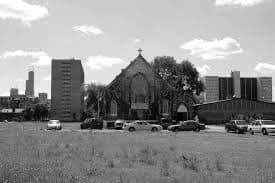For years, faith communities have been involved in housing efforts, whether through shelters, transitional housing, or charity-driven development projects. But faith-based housing goes further. It’s not just about providing emergency relief—it’s about permanently changing how land is used to serve communities long-term. Many congregations own large pieces of land, vacant buildings, or underutilized parking lots that could be turned into housing. Instead of selling to developers, these institutions are stepping into the role of housing providers themselves, partnering with nonprofits and mission-driven builders to create new places for people to live.
Cities benefit because faith-based housing initiatives increase the supply of housing without displacing anyone. These projects often fill in underutilized spaces, adding density in a way that doesn’t generate the usual backlash. Neighbors are less likely to oppose development when it comes from a trusted local institution rather than an outside investor looking to turn a profit. And because these efforts are community-led and mission-driven, they focus on affordability and stability rather than maximizing returns.
For individuals, especially lower-income residents, this model provides housing that is not just affordable but also connected to a larger support network. Many faith-based housing projects offer below-market rents and prioritize local families, and because they are tied to religious institutions, they often come with built-in services like job assistance, childcare, and social connections. Housing isn’t just about four walls and a roof; it’s about belonging.
Some of the most successful projects have been in places like Seattle, Washington D.C., and Los Angeles, where housing costs are high and faith institutions hold millions of square feet of untapped real estate. But this isn’t just a big-city solution. Smaller cities and even rural areas have faith communities with land they aren’t fully using, and many struggling congregations could repurpose their properties in a way that meets local housing needs while sustaining their ministries.
At a time when building affordable housing seems to require endless layers of tax credits, government approvals, and funding battles, faith-based housing initiatives offer something refreshingly straightforward. Cities should be paying attention, and more importantly, making sure their policies help rather than hinder these efforts. There’s no reason this model couldn’t work in places where plenty of faith institutions sit on land that could be turned into housing. If we’re serious about making cities more livable and affordable, supporting these efforts should be part of the plan.









Beyond the spectacle, Kansas City prepares for World Cup reality